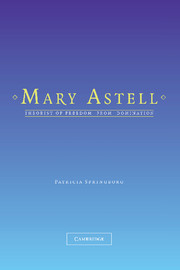Book contents
- Frontmatter
- Contents
- Acknowledgements
- Mary Astell, a Brief Chronology
- Introduction: Astell and Early Modern Feminism
- 1 Mary Astell, Philosopher, Theologian and Polemicist
- 2 Astell, Drake, Education, Epistemology and the Serious Proposal
- 3 Astell on Marriage, Patriarchalism and Contractarianism
- 4 Mary Astell and the Settlement of 1689
- 5 A Fair Way with the Dissenters and Their Patrons
- 6 Astell, Locke and the Highway Man: A Test Case
- 7 Astell, Drake and the Historical Legacy of Freedom
- Appendix: Glossary and Select Biographical Notes
- Notes
- Select Bibliography
- Index
6 - Astell, Locke and the Highway Man: A Test Case
Published online by Cambridge University Press: 07 September 2009
- Frontmatter
- Contents
- Acknowledgements
- Mary Astell, a Brief Chronology
- Introduction: Astell and Early Modern Feminism
- 1 Mary Astell, Philosopher, Theologian and Polemicist
- 2 Astell, Drake, Education, Epistemology and the Serious Proposal
- 3 Astell on Marriage, Patriarchalism and Contractarianism
- 4 Mary Astell and the Settlement of 1689
- 5 A Fair Way with the Dissenters and Their Patrons
- 6 Astell, Locke and the Highway Man: A Test Case
- 7 Astell, Drake and the Historical Legacy of Freedom
- Appendix: Glossary and Select Biographical Notes
- Notes
- Select Bibliography
- Index
Summary
Locke and the Settlement of 1689
Locke's contribution to the constitutional debate of 1688–9 has gradually been reevaluated. For some time it had been minimized, due to the anonymity of the Two Treatises, written between 1681 and 1683, published in 1689 but with 1690 on the title page, and officially acknowledged by Locke only in the codicil to his will of 1704. Peter Laslett, in a pioneering work of textual excavation, developed the thesis that Locke's Two Treatises on Government were not in fact a rationalization of the Glorious Revolution of 1688, as had hitherto been believed, but a work written in the Exclusion Crisis of 1679–83, during which the principle of Stuart dynastic rule was formidably challenged. For the Glorious Revolution is generally seen as the coup d'état that brought to fruition the steady erosion of James II's legitimacy over this period. Among Whigs, James had so thoroughly discredited himself that opposition to his removal is said to have been negligible. It was the terms in which he was removed that were fought over. These ranged from Tory theses of James's moral incapacity to rule, evidenced by his tyranny; to loyalist ‘theses of contract, non-contractarian resistance, possession, conquest and abdication’; to Whig political arguments with roots in the radical reformation thinkers Calvin, Luther and Melancthon. Among the works in which these positions were debated, only two references to Locke's Two Treatises are to be found, both by Whig radicals.
- Type
- Chapter
- Information
- Mary AstellTheorist of Freedom from Domination, pp. 187 - 208Publisher: Cambridge University PressPrint publication year: 2005



